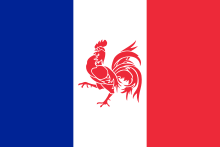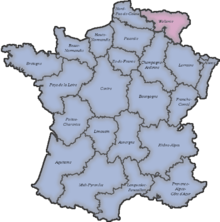Rattachism


Rattachism (French: Rattachisme) or Reunionism (Réunionisme) is minor political ideology which calls for the French-speaking Belgium or Wallonia to secede from the Belgian nation-state and become part of France. Brussels, which is majority French-speaking but located in Flanders, may be included within this ideology as may the six Flemish municipalities with language facilities for French-speakers. It can be considered a French-speaking equivalent of Orangism or Grootneerlandisme in Flanders.
The Rattachist ideology is associated with a faction of the Walloon Movement and is advocated by the political parties Walloon Rally and Wallonia-France Rally. Neither party has ever gained parliamentary seats.
History
The Southern Netherlands were invaded and annexed by the First French Republic in 1795, ending Habsburg rule. After Napoleon's defeat at the Battle of Waterloo in 1815, the major victorious powers agreed at the Congress of Vienna on reuniting the former Austrian Netherlands and the former Dutch Republic, creating the United Kingdom of the Netherlands, which was to serve as a buffer state against any future French invasions. King William imposed Dutch as the main language, while French was the language of the bourgeoisie in the Southern Netherlands. They were also significantly underrepresented in the Dutch Assembly. These and other reasons caused in 1830 the Belgian Revolution, supported by France. The Southern Netherlands declared independence, becoming the Kingdom of Belgium. However, some of the proponents of secession from the Netherlands, preferred union with France rather than an independent country, but the major European powers decided on an independent neutral Belgium in the Treaty of London. The Flemish of the new state of Belgium now became as oppressed by the francophones of Wallonia as the latter had been under Dutch rule, leading to the tensions and movements for Flemish independence ever since.
Term "Rattachism"
The "r" in "rattachism" (from "re-" and "attach"), indicating a re-unification, is in reference to a future unification being a repeat occurrence, after the previous "unity" which transpired during the "French period" (1794–1815) after the French Revolutionary Wars.